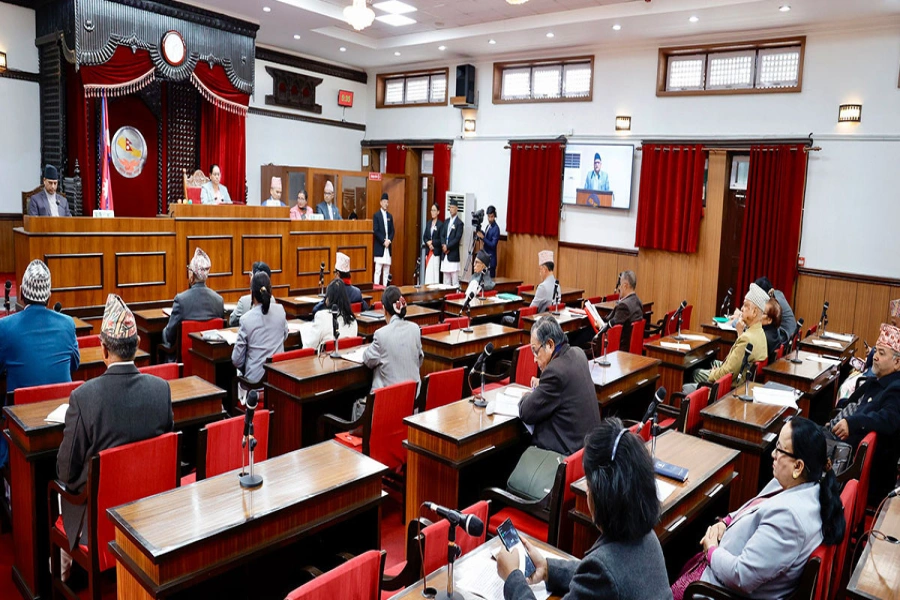KATHMANDU, June 7: The import of fertilizers (chemical and organic combined) in the first 10 months of the current fiscal year has surged by nearly half compared to import figures of the same period of Fiscal Year 2016/17.
According to Department of Customs, Nepal imported Rs 12.9 billion worth of fertilizer in the first 10 months of FY 2017/18, compared to Rs 7.3 billion worth of imports over the first 10 months of last fiscal year.
In FY2016/17, Nepal had imported fertilizers worth Rs 11.5 billion.
While officials of the Ministry of Agriculture, Land Management and Cooperatives attribute the rise in fertilizers imports to increased supply to farmers, farmer leaders termed such a huge leap in import as 'unnatural'.
DoC report suggests that only 1.1 percent of the imported fertilizers is organic, while the remaining 98.2 percent are mineral or chemical fertilizers.
Farmers to face fertilizer shortage next year too

Although knowledgeable sources say that production and use of organic fertilizers is growing in the country, they claim that farmers in tarai region of Nepal seldom use organic fertilizers. They are more inclined to using chemical fertilizers such as urea, the sources added.
The import of fertilizers made up of organic material such as vegetables and animal waste has fallen by 9.6 percent i.e. from Rs 151.4 million worth of organic fertilizers to Rs 136.8 million in the first 10 months of FY 2017/18.
Meanwhile, the import of mineral-based chemical fertilizers is increasing significantly. Nitrogenous fertilizers such as urea worth Rs 7.1 billon entered the country in the first 10 months of FY2017/18. Such import was worth only Rs 2.1 billion in the same period of FY2016/17.
While urea provides nitrogen to plants resulting in a rapid growth, the effect its overuse can cause to soil is detrimental.
Likewise, there imports of phosphorus-based chemical fertilizers surged by over nine times in the review period. The DoC report states that the import of such fertilizes surged from Rs 20.1 million in first months of FY2016/17 to Rs 188.2 million in the first 10 months of the current fiscal year.
Likewise, the import of fertilizers consisting of two or more elements have also increased by 12.5 percent to Rs 5.2 billion in the review period of FY2017/18 compared to Rs 4.6 billion in the same period of last fiscal year.
The import of potassium-based fertilizers however fell to Rs 437.7 million in the first 10 months of FY2017/18, compared to Rs 82.96 million worth of imports in the first 10 months of last fiscal year.
Speaking with Republica, Mani Ratna Aryal, senior agriculture economist and information officer with the ministry, stated: “There has been a steep increase in import of fertilizers and the reason behind this is that the government has been able to properly supply fertilizers to farmers. Although there used to be a short supply of fertilizers in the market in previous years, this was not the case this year.”
According to Aryal, the government also provided large amount fertilizers to farmers affected by floods on grants.
Regarding the excessive import of chemical fertilizers, Aryal stated that farmers, particularly those in the tarai region, have been utilizing chemical fertilizers like urea in the hope of rapid production. “However, such chemical fertilizers have adverse effect on soil quality. I feel that proper marketing of organic fertilizers has not been done as much as chemical fertilizers. So, it is important to set up distribution centers specifically for organic fertilizers,” he added.
Uddhav Adhikari, chairperson of National Farmers Group Federation (NFGF), told Republica that the growth in import of fertilizer is not natural. “Majority of farmers in the tarai region use chemical fertilizers as use of organic manure is not so common there. Moreover, the manure produced is used to generate energy,” he added. “The government must prioritize traditional farming along with livestock to curb the use of chemical fertilizers.”



































